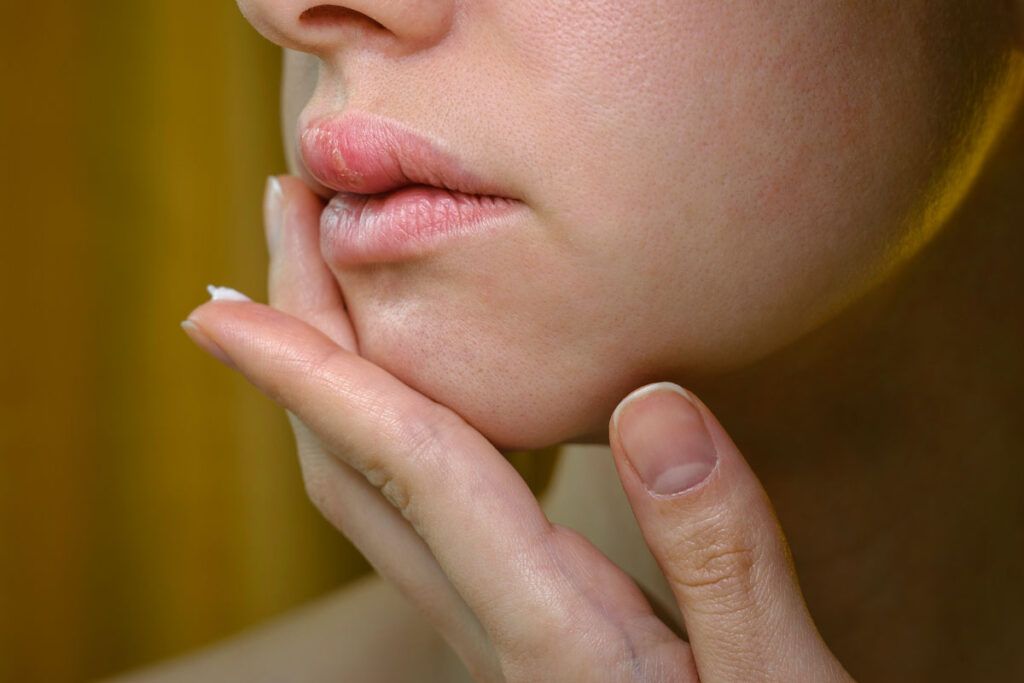Cold sores are blister-like ulcers on, inside, or around the mouth. An infection with the herpes simplex virus causes them.
Herpes simplex virus type 1 (HSV-1) is more likely to cause oral herpes, but herpes simplex virus type 2 (HSV-2) may also lead to cold sores.
Both HSV-1 and HSV-2, although more likely the latter, also lead to genital herpes, which typically manifests as sores on or around the genital area.
Some people may refer to oral or genital herpes simply as “herpes.” However, this generalization is not accurate and may be confusing.
What are cold sores?

Cold sores are fluid-filled blisters that develop around or inside the mouth after contracting the herpes simplex virus. They are transmitted from person to person after being in direct contact with someone who already has oral herpes.
These highly infectious sores, also called fever blisters, may become painful. Kissing, licking, sucking, or touching the mouth of a person with oral herpes may lead to acquiring the viral infection, whether or not that person has active cold sores.
Cold sores can reappear once or more times during a lifetime. Although having oral herpes may not always show symptoms, there is currently no cure for oral herpes. When symptoms present, this is referred to as an oral herpes outbreak.
Common triggers for oral herpes outbreaks may include:
- acute health conditions like the flu
- exposure to the sun
- menstrual period or hormonal changes
- physical stress or exhaustion
- emotional stress
What is herpes?
Herpes is a type of virus. Although eight herpes virus strains typically cause infections in humans, there are over 100 strains.
Herpes viruses that commonly affect humans include:
- HSV-1
- HSV-2
- varicella-zoster virus
- cytomegalovirus
- Epstein-Barr virus
- human herpesvirus A and B
- Kaposi’s sarcoma-associated herpesvirus (KSHV)
However, “herpes” is often used to refer to two conditions: oral herpes and genital herpes.
HSV-1 and HSV-2 infections that manifest with mouth, throat, and lip sores are referred to as oral herpes. HSV-1 and HSV-2 infections that manifest with sores on or around the vagina, cervix, penis, scrotum, buttocks, and anus are known as genital herpes.
Neither oral nor genital herpes has a cure.
Are cold sores an STI?
Cold sores are not a sexually transmitted infection (STI). They are symptoms of a herpes simplex viral infection that does not require sexual or genital contact for transmission.
However, it is possible to develop oral herpes after an intimate encounter if intimacy involves kissing or touching a partner’s mouth and they have oral herpes.
Cold sores can also develop following nonsexual direct contact with a person who has an active infection. For example, a child may acquire the herpes simplex virus by kissing or touching the face or mouth of a person with oral herpes.
It is also possible to transmit the herpes simplex virus through oral sex. Kissing, licking, or touching the genitals of a partner may transmit the virus to them if you have oral herpes. In that case, they may develop genital herpes symptoms.
Genital herpes is an STI. Genital-to-genital or oral-to-genital contact is necessary for transmission.
It is uncommon to develop oral herpes by performing oral sex on a partner with genital herpes.
Symptoms of herpes simplex viruses
Cold sores are the primary symptom of a herpes simplex viral infection on or around the mouth.
It’s typically to experience a burning or tingling sensation when cold sores first develop. These sores may then show as fluid-filled blisters and may become painful. They may also form clusters on your lips, around your nose, inside your mouth, and on your throat.
As cold sores heal, scabs will typically form on the site and then peel off. This may cause an itchy sensation.
Genital herpes infections may present with painful ulcers or blisters on the genitals, including the anus and buttocks. These sores may also become itchy and cause localized redness and irritation. Oozing and bleeding at the sore sites can also occur.
If genital sores develop inside the vagina or penis, it’s typical to experience painful urination and genital discharge.
Flu-like symptoms are also possible with both oral and genital herpes. These symptoms may include low grade fever, inflamed lymph nodes, headaches, and fatigue. This is more likely to occur during the initial outbreak.
Treatment options
Currently, there’s no cure for HSV-1 and HSV-2 infections. Once the virus is acquired, it will remain in the body. Some people may experience outbreaks every few months, while others may not have any.
Stress management may help reduce the chance of herpes outbreaks. Meditation, regular exercise, optimal sleep hygiene, and talk therapy can help manage the type of stress and anxiety that could activate the herpes simplex viruses.
Identifying and avoiding other triggers, like sun exposure, may also help reduce the chance of cold or genital sores.
Sores caused by the herpes simplex virus typically resolve on their own. However, pain and itchiness may require medical assistance for symptom relief.
Treatment for active herpes simplex virus infections may include:
- antiviral medications like valacyclovir (Valtrex), acyclovir (Zovirax), and famciclovir (Famvir)
- pain relievers like paracetamol, naproxen, and ibuprofen
- over-the-counter applications for cold sores, like 1-docosanol (Abreva)
If you need help covering the cost of medications, the free Optum Perks Discount Card could help you save up to 80% on prescription drugs. Follow the links on drug names for savings on that medication, or search for a specific drug here.
